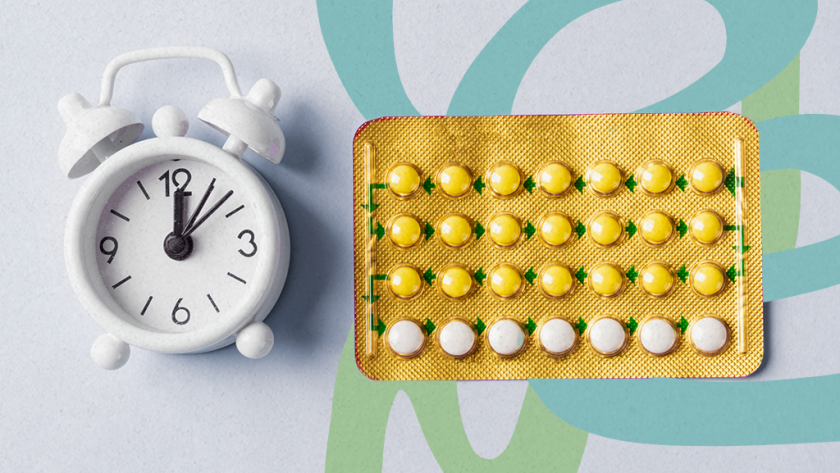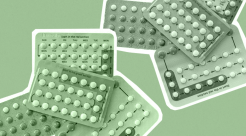
You can find a lot of information about contraception on the internet, on social media and through talking to friends and family. While some of it may be accurate, there is lots of information that is incorrect, as well as many ‘myths’ and misconceptions. It can be difficult to know what the facts really are.
One common concern we hear is that contraception will ‘mess with your hormones’, or that after stopping a particular method of contraception, that you need to ‘reset’ your hormones to ‘get your body back on track’.
What are the facts? Let’s break it down.
How does hormonal contraception work?
Hormonal contraception includes the oral contraceptive pill (the Pill), progestogen-only pill (the mini-pill), the vaginal ring, contraceptive implant (Implanon NXT), contraceptive injection (Depo) and hormonal intrauterine devices (the Mirena IUD and Kyleena IUD). These all contain hormones similar to those that occur naturally in the body – oestrogen and/or progestogen – to help prevent pregnancy.
In order to work as contraception, these methods affect your body in various ways, including:
- Preventing ovulation (Stopping eggs being release from the ovaries each month)
- Thickening the mucus in the cervix (neck of the womb) (Making it harder for sperm to move through it and reach an egg)
- Altering the lining of the uterus (womb) (Making it less likely that a fertilized egg will implant).
These changes are intentional and controlled and are designed to effectively prevent pregnancy.
Does contraception ‘mess with your hormones’?
The phrase ‘mess with your hormones’ can sound alarming, and it’s a bit misleading.
While they are being used, hormonal contraceptive methods can influence and alter your body’s ‘natural’ hormone levels – in fact, this is how they prevent a pregnancy from happening.
However, it’s important to understand that this is a predictable, temporary and targeted effect and is not something that causes lasting damage or disruption to your body or your physiology. A temporary, intentional change in hormone level, related to contraception, isn’t anything to fear.
For most people, these hormone changes often come with added benefits, such as:
- Regulating the menstrual cycles (helping with irregular periods, reducing heavy bleeding and easing menstrual cramps)
- Improving acne (by lowering certain hormones that can cause breakouts)
- Reducing the risk of certain cancers (certain hormonal contraception has been shown to lower the risk of ovarian and endometrial cancers).
That said, hormonal contraception does have some potential side effects. Some people may experience mood changes, headaches, weight fluctuations or changes in libido (desire to have sex). These side effects vary from person to person. Some people are more likely to experience small changes in hormone levels, compared to others. What might be a perfect fit for one person may not suit the next person.
It’s important to remember that there are many different types of hormonal contraception, each containing different levels and types of hormones. This means that if one type of hormonal contraception doesn’t work for you, it doesn’t mean that all hormonal contraception will have the same negative side effects for you.
It’s all about finding the method of contraception that suits your body and your lifestyle. Also, different contraception methods may suit you at different times in your life.
Do you need to ‘reset’ your hormones after stopping contraception?
The idea that you need to ‘reset’ or ‘balance’ your hormones after stopping contraception has become popular, particularly on social media. However, this concept isn’t supported by scientific evidence. Your body is incredibly clever and is designed to naturally return to its regular hormonal rhythm after you stop hormonal contraception.
When you stop using hormonal contraception, your body begins to restore the natural menstrual cycle. This typically occurs within a few weeks to a few months, depending on the method. There’s no need for special detoxes, supplements or diets to ‘reset’ your hormones—your body does this on its own.
Many people are also worried that hormonal contraception will somehow cause infertility (difficulty becoming pregnant) long after stopping the contraception. This is not the case – your fertility will return to what is normal for you after you stop using the method.
While it’s normal to experience some temporary changes as your body adjusts, such as irregular periods, these usually resolve themselves. If you’re noticing ongoing issues, it’s a good idea to speak with a healthcare provider to rule out any underlying concerns.
Of course, there are general healthy habits which can keep you feeling as good as possible, at all stages of your life. These include eating a healthy diet, getting enough sleep, being physically active, managing stress and limiting alcohol, drugs and cigarettes. However, it’s important to know that you don’t need to do anything specific to ‘reset’ or ‘balance’ your hormones.
What should you do if you’re worried?
If you’re concerned about the side effects of your contraceptive method, or have any other questions, it’s important to have a conversation with a doctor or a sexual health service like SHINE SA.
They can help you evaluate your options and find a contraceptive method that aligns with your health needs and personal preferences.
Non-hormonal options, such as condoms, copper IUDs, or fertility awareness methods, are also available if you prefer to avoid hormones altogether.
The bottom line
Hormonal contraception does influence your hormones while you are using it, but it doesn’t ‘mess with them’ in a harmful way.
The changes it brings about are designed to be temporary and are reversible once you stop using the contraception. There’s no need to ‘reset’ your hormones with special diets, supplements or exercises—your body is well-equipped to handle this transition naturally and usually does a great job of regulating hormones all by itself.
At SHINE SA, we’re here to provide you with accurate, evidence-based information and support. If you have questions or concerns about how contraception might affect your hormones, we’re here to help.
Want to know more?
If you’d like more information you can speak to SHINE SA’s Sexual Healthline, make an appointment at SHINE SA, or contact a doctor/health service.










